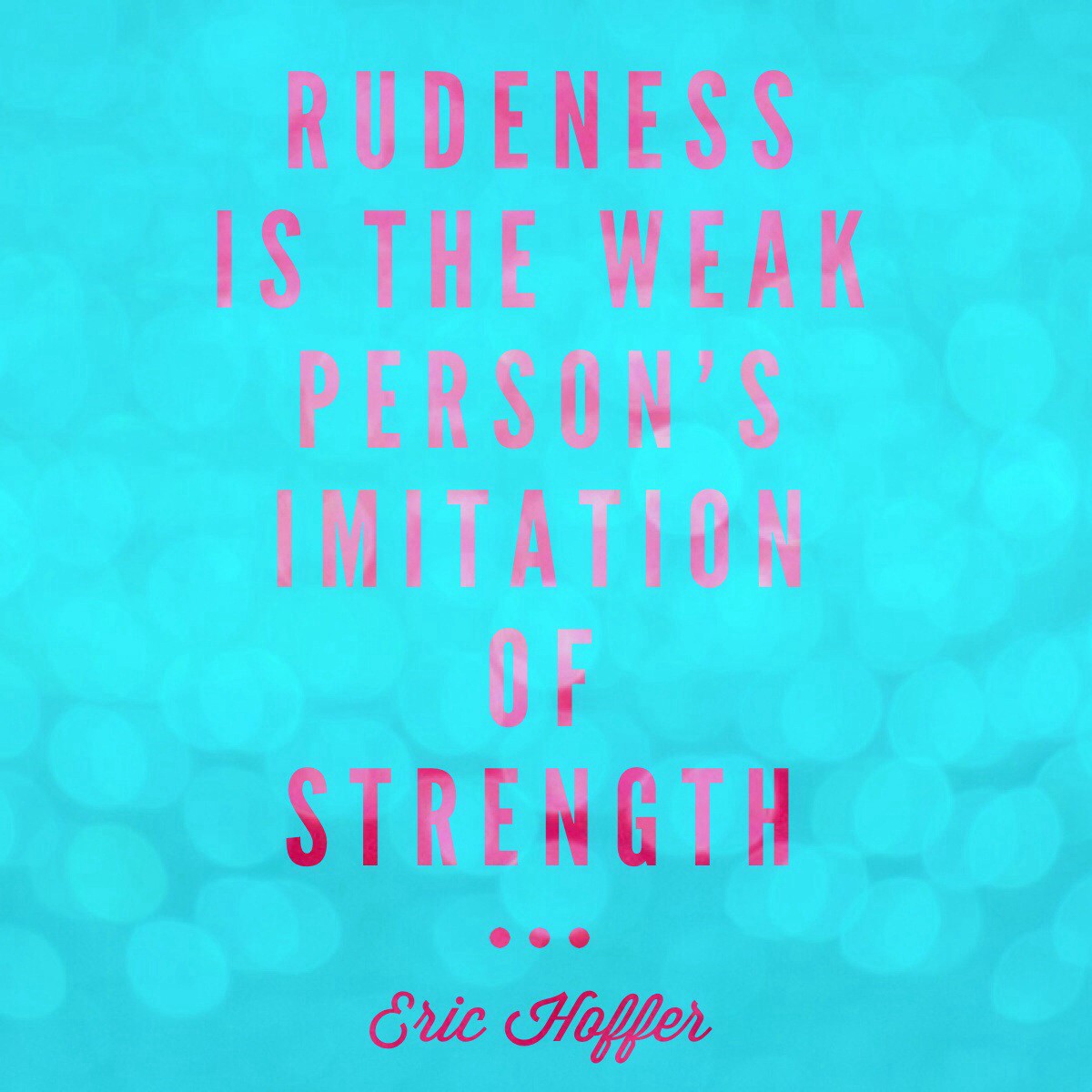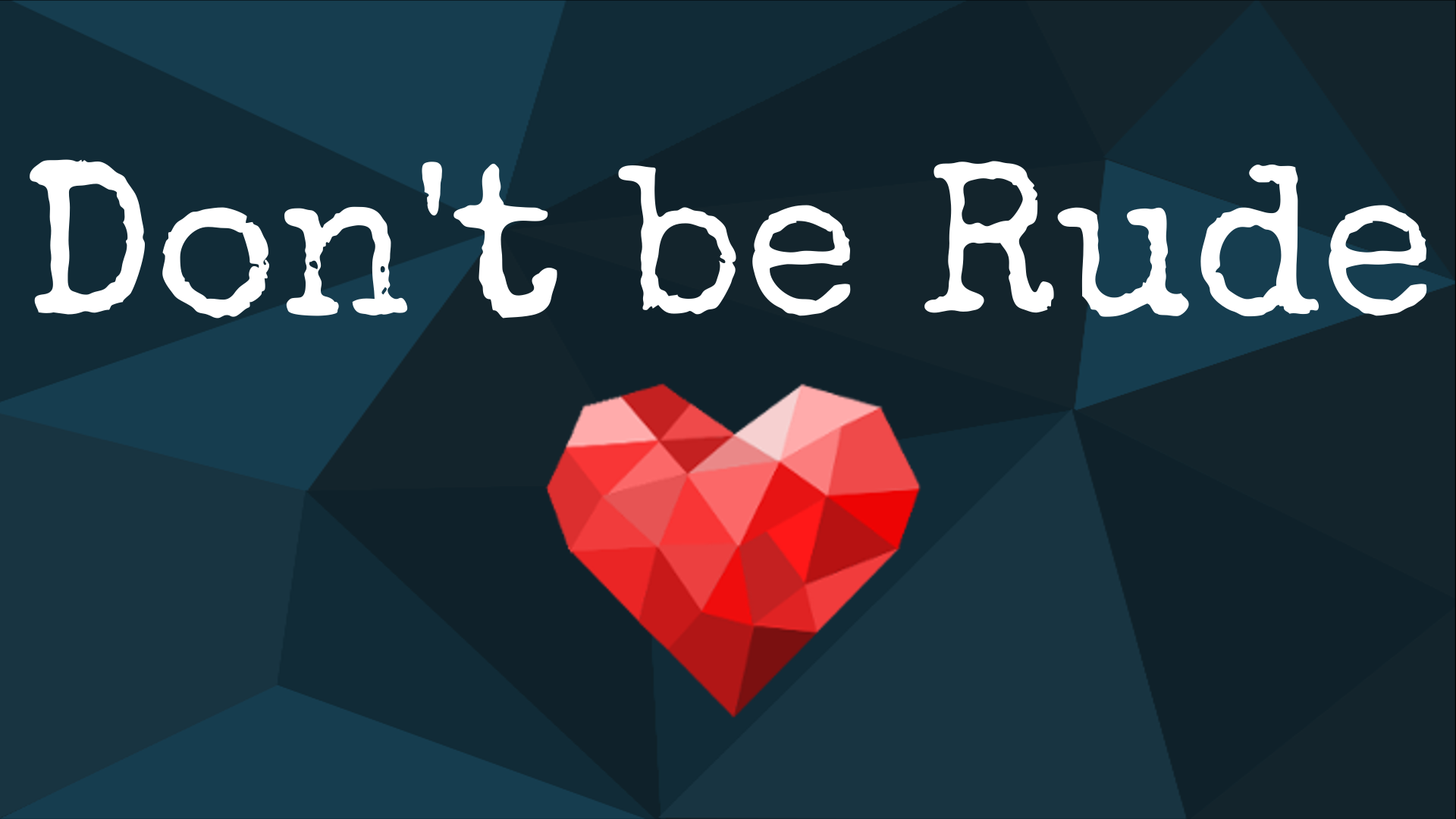Hey there, friend! Ever found yourself in a situation where someone's rude behavior just kinda threw you off? Yeah, it happens to the best of us. Whether it's at work, school, or even on social media, rudeness can feel like a slap in the face. But here's the thing—don't be rude, okay? Being polite isn't just about following rules; it's about showing respect and kindness to others. And trust me, the world could use a lot more of that right now.
In this fast-paced world we live in, it's easy to forget how important manners are. We're all busy, stressed, and sometimes we just snap. But hey, being polite doesn't mean you're weak or that you're letting people walk all over you. It's about being conscious of how your actions affect others. And honestly? It feels good to be the person who spreads positivity instead of negativity.
Now, before we dive deep into the art of not being rude, let's get one thing straight: this isn't about being fake or pretending to be someone you're not. It's about understanding that politeness is a choice, and it's a choice that can make a huge difference in your life and the lives of those around you. So stick around, and let's figure out how to keep things respectful, shall we?
- Master These Acrobatic Tricks For Beginners And Level Up Your Skills Today
- Eeyore Crocs The Coziest Trend Thats Stealing Hearts Worldwide
What Does "Don't Be Rude" Really Mean?
When we talk about not being rude, we're not just talking about holding the door open for someone or saying "please" and "thank you." Sure, those things are important, but there's a deeper meaning here. Being rude often stems from a lack of empathy—a failure to consider how our words and actions might affect others. And in today's world, where everyone's got an opinion and a keyboard, it's easier than ever to unintentionally hurt someone.
Let's break it down a bit:
- Being rude can mean interrupting someone when they're speaking.
- It can mean rolling your eyes or making sarcastic comments.
- It can even mean ignoring someone's boundaries or dismissing their feelings.
See? Rudeness isn't always obvious. Sometimes it's the little things that add up and make someone feel disrespected. So, if you're wondering how to avoid being rude, it starts with paying attention to the little stuff.
- Azealia Banks July 7 The Untold Story Music And Controversies
- Dank Tell The Ultimate Guide To Understanding This Trendy Slang
Why Being Polite Matters
Alright, let's talk about why being polite is such a big deal. It's not just about making yourself look good (though, let's be real, it does). Being polite helps create a more positive and respectful environment for everyone. Think about it: when you're kind and considerate, it sets the tone for the people around you. And that ripple effect? It's powerful.
Studies have shown that politeness can improve mental health, reduce stress, and even boost productivity. Yeah, you heard me right. When people feel respected and valued, they're more likely to perform better at work and in their personal lives. So, by choosing not to be rude, you're not just helping others—you're helping yourself too.
Politeness in the Workplace
In the workplace, being polite isn't just a nice-to-have—it's a must-have. Whether you're dealing with coworkers, clients, or even your boss, showing respect and professionalism can go a long way. It helps build trust, fosters collaboration, and creates a more harmonious work environment.
Here are a few tips for staying polite at work:
- Listen actively when others are speaking.
- Avoid gossiping or spreading rumors.
- Show appreciation for your colleagues' hard work.
And hey, if you're in a leadership position, remember that your behavior sets the tone for the entire team. Lead by example, and watch how it inspires others to follow suit.
Common Rude Behaviors to Avoid
So, what are some common rude behaviors that we should all try to avoid? Let's take a look:
- Interrupting: This one's a big no-no. When someone's speaking, give them your full attention. It shows that you value their thoughts and opinions.
- Using your phone during conversations: Yeah, I know, we're all glued to our screens. But when you're talking to someone, put the phone down and focus on the person in front of you.
- Being late without a good reason: Time is valuable, and showing up late sends the message that you don't respect other people's time.
These might seem like small things, but they can have a big impact on how others perceive you. And let's be honest—no one likes being around someone who's constantly rude, right?
Rudeness in Digital Spaces
Now, let's talk about rudeness in the digital world. Social media, online forums, and even email can be breeding grounds for bad behavior. It's easy to forget that there's a real person on the other side of the screen, and that can lead to some pretty hurtful interactions.
Here are a few tips for staying polite online:
- Think before you post. Would you say the same thing to someone's face?
- Use emojis sparingly. They can sometimes come across as sarcastic or dismissive.
- Respect people's privacy. Don't share personal information without their permission.
Remember, just because you're behind a screen doesn't mean your words don't have consequences. Be mindful of how you communicate online, and always aim for kindness.
The Psychology Behind Rudeness
So, why do people act rudely in the first place? Well, there are a few psychological factors at play here. For one, rudeness can often stem from stress or frustration. When people are feeling overwhelmed, they might lash out at others without even realizing it. And let's not forget about cultural differences—what might seem rude to one person could be perfectly acceptable in another culture.
But here's the thing: understanding why someone is being rude doesn't mean you have to accept it. You can still choose to respond with kindness and empathy, even when someone else is acting out. And who knows? Your positive response might just help diffuse the situation and turn things around.
How to Handle Rudeness
Alright, so what do you do when someone is being rude to you? Here are a few strategies to help you handle the situation with grace:
- Stay calm: It's easy to get defensive, but try to keep your emotions in check. Reacting with anger will only escalate the situation.
- Address the behavior, not the person: Instead of calling someone out for being rude, focus on the specific behavior that's bothering you. For example, "I noticed you interrupted me earlier. Can we try to have a more respectful conversation?"
- Know when to walk away: If someone is being consistently rude and unapologetic, it might be time to distance yourself from the situation.
Handling rudeness isn't always easy, but with a little practice, you can learn to navigate these situations with confidence and grace.
The Benefits of Not Being Rude
Okay, so we've talked a lot about why you shouldn't be rude, but what are the actual benefits of being polite? Let's break it down:
- Improved relationships: When you're kind and respectful, people are more likely to want to be around you. Whether it's friends, family, or coworkers, politeness helps build stronger, more meaningful connections.
- Increased respect: People are more likely to respect you when you show them respect in return. It's a two-way street, after all.
- Reduced stress: Believe it or not, being polite can actually help lower your stress levels. When you're not constantly on edge about potential conflicts, you can focus on more positive things in your life.
So, by choosing not to be rude, you're not just making the world a better place—you're also improving your own well-being. Sounds like a win-win to me!
Politeness in Everyday Situations
Let's talk about how you can practice politeness in everyday situations. Whether you're at the grocery store, in line at the coffee shop, or even just walking down the street, there are countless opportunities to show kindness and respect to others.
Here are a few examples:
- Hold the door open for someone behind you.
- Offer to help someone who's struggling with their groceries.
- Smile and say hello to strangers—it might just make their day a little brighter.
These small acts of kindness might seem insignificant, but they can have a huge impact on the people around you. And who knows? You might just inspire others to pay it forward.
Conclusion: Spread Positivity, Not Rudeness
Alright, we've covered a lot of ground here, haven't we? From understanding what rudeness really means to learning how to handle it in everyday life, we've explored the importance of choosing kindness over negativity. And let's be honest—it's not always easy. But every time you choose not to be rude, you're making a difference in the world.
So, here's my challenge to you: go out there and spread positivity. Be the person who lifts others up instead of tearing them down. And remember, politeness isn't just about following rules—it's about showing respect and compassion to everyone you meet.
Now, it's your turn. Leave a comment below and let me know how you plan to practice politeness in your daily life. Or, if you found this article helpful, share it with your friends and family. Together, we can create a world where rudeness is a thing of the past. Let's do this!
Table of Contents
- Eeyore Crocs The Coziest Trend Thats Stealing Hearts Worldwide
- Thousand Sunny Size Comparison Dive Into The Iconic Straw Hat Pirates Ship


